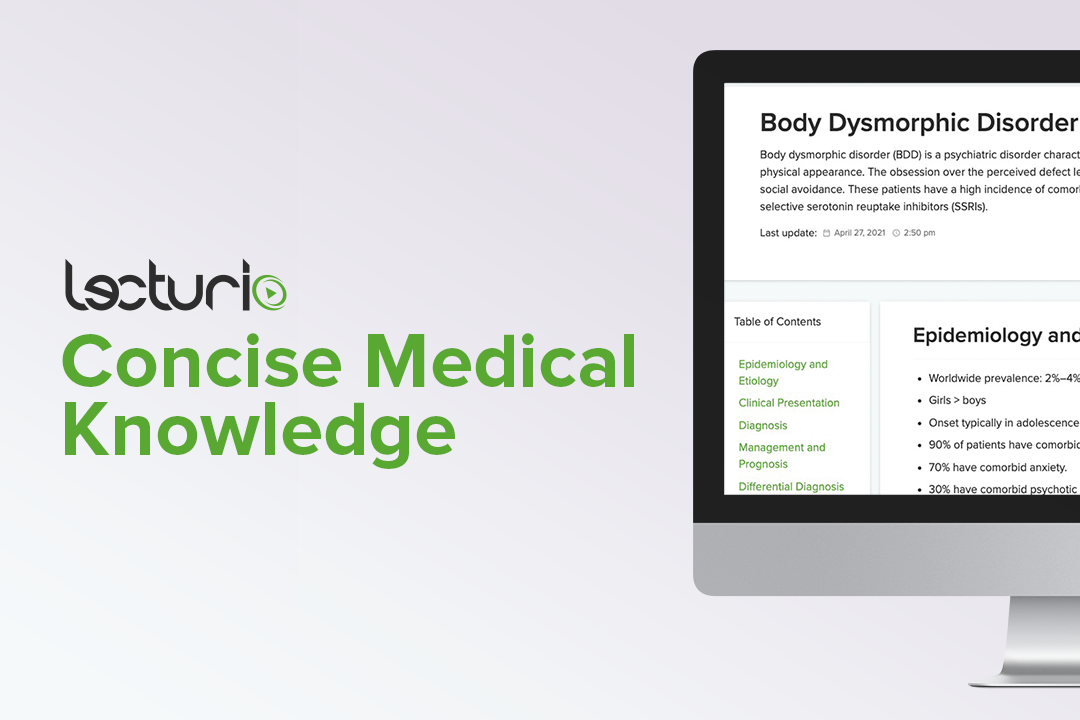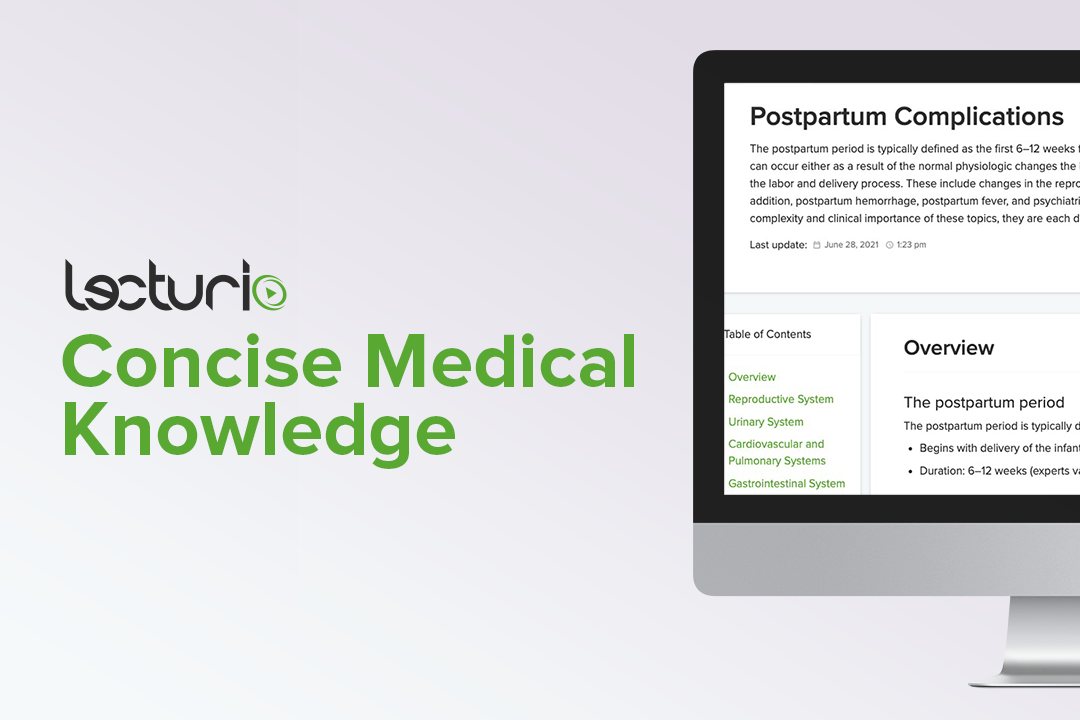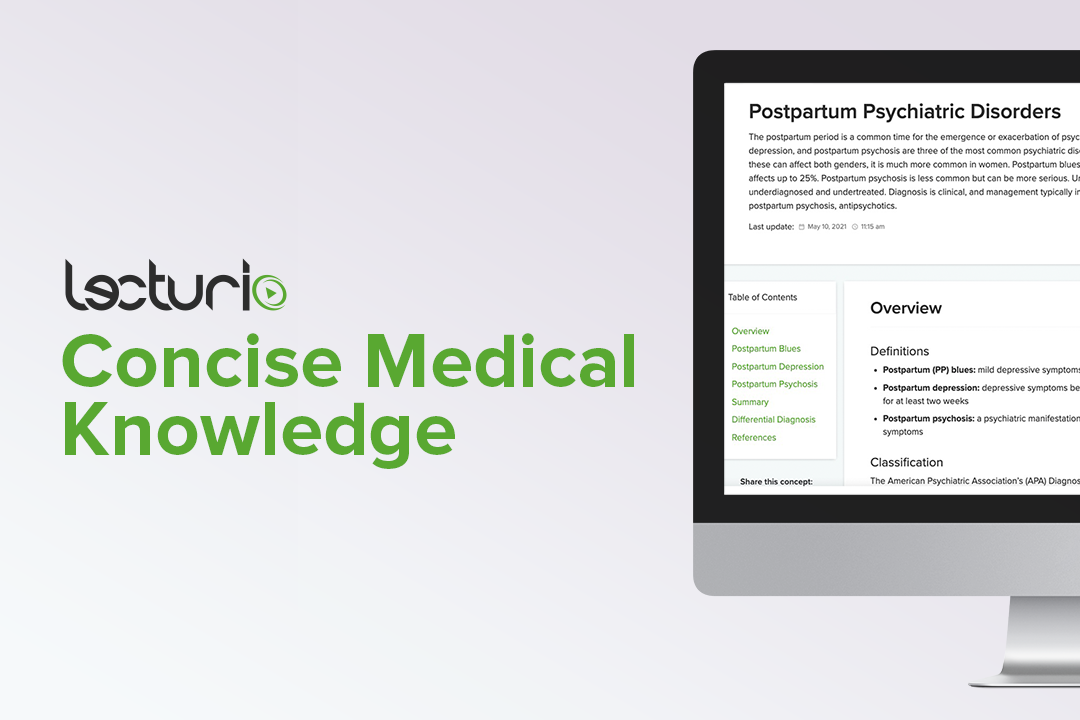Playlist
Show Playlist
Hide Playlist
Postpartum Psychiatric Disorders
-
Slides PsychiatricDisordersinPregnancy Obstetrics.pdf
-
Download Lecture Overview
00:01 Now we'll talk about psychiatric disorders in pregnancy. 00:04 So there are three psychiatric disorders that we see in pregnancy. 00:09 Postpartum Blues, Postpartum Depression and Postpartum Psychosis. 00:13 Let's take the time to explore each of these. 00:17 So postpartum blues. 00:18 It occurs in about 50 to 80% of pregnancies so it's very common. 00:23 The symptoms are guilt, crying, feeling overwhelmed. 00:28 And the onset is usually anywhere between birth to 2 weeks after delivery. 00:32 The treatment spontaneous. 00:36 It resolves on it's own. 00:37 So you just reassure mom if she has these symptoms. 00:40 Next is postpartum depression. 00:46 Now there are risk factors for postpartum depression. 00:49 You need to be aware of these so that when you see our patients during pregnancy, you also make them aware that if the symptoms start to happen associated with postpartum depression, they should seek your care. 01:01 So if the patient has a history of postpartum depression or depression in general, they are at increased risk for developing postpartum depression. 01:09 If they have poor social support. 01:13 If the baby has health or there's another baby that they're taking care of or another child that they are taking care of that has health problems, they are at increased risk for developing postpartum depression. 01:23 If they have difficulty with breastfeeding. 01:26 If we remember from the breastfeeding lecture, breastfeeding is one of the things that protects us against postpartum depression. 01:33 So if there's difficulty with breastfeeding this can be a risk factor. 01:36 And also for families or moms that have financial difficulties. 01:42 They are increased risk for developing postpartum depression as well. 01:45 So with postpartum depression it occurs in approximately 15 to 25% of pregnancies. 01:52 Now the rate may actually be a bit higher. 01:54 Because sometimes when we are not great at diagnosing it. 01:57 Speaking of diagnosis, there is a way to diagnose postpartum depression. 02:02 It is called the Edinburgh Postnatal Depression Scale. 02:05 This scale is administered from 2 weeks up to a year after delivery. 02:10 It's a self administered questionnaire where patients are able to access how well they are coping with their new state of being a mom. 02:19 It's very good in determining who has postpartum depression. 02:24 So what are those symptoms, inability to cope. 02:26 If they have disinterest in them self, disinterest in their child, disinterest in their normal activities. 02:32 That patient may have postpartum depression. 02:34 Onset of symptoms can be anywhere from 2 weeks up to a year after the birth of their child. 02:41 The treatment is psychotherapy and SSRI's. 02:45 So the literature shows that doing psychotherapy works well. 02:49 Doing medication works well. 02:51 But the two working together, works the best. 02:56 Now postpartum psychosis. 03:00 This is very rare. 03:03 We see this in less than 1% of pregnancies. 03:06 Symptoms are the same as typical psychosis. 03:09 Meaning patients may experience visual or auditory hallucinations. 03:14 The onset of symptoms can be anywhere from 2 weeks up to a year after the delivery. 03:20 Now the treatment for psychosis is, because it is a more severe form of psychiatric disorder re to start anti-psychotics under the care of psychiatrist. 03:30 This is not typically diagnosis obstetricians will take care of. 03:37 Now, let's review that again. 03:38 Epidemiology for postpartum blues 50 to 80% of pregnancies. 03:43 Symptoms guilt, crying, being overwhelmed. 03:47 Onset 2 weeks and it resolves spontaneously. 03:50 Postpartum depression. 03:52 15 to 25% of pregnancies. 03:55 Symptoms inability to cope, disinterest for self or child. 03:59 Onset being 2 weeks up to year after delivery. 04:02 Treatment psychotherapy and SSRI's. 04:05 Postpartum psychosis, occurs then less than 1% of pregnancies. 04:09 Symptoms are visual and auditory hallucinations. 04:12 Onset of symptoms, 2 weeks up to a year after delivery. 04:16 And treatment anti-psychotics under the care of psychiatrist. 04:20 Of note, in any of these situations if the patient is complaining of homicidal or suicidal ideation, that patient needs to be referred to the emergency room for immediate hospitalization. 04:34 So let's take a case. 04:35 This is a 19 year old gravida 1 para 1 female that presents to your office 2 weeks after an emergency C-section for evaluation of her incision. 04:47 You notice that she appears unkempt and she seems disinterested in her infant. 04:53 Upon further questioning, she reports separating from her partner and has poor family support. 05:00 She reports crying all the time and she's having difficulty coping. 05:04 The next best step in managing this patient is . 05:07 A. Reassurance. 05:09 B. Begin a Selective Serotonin Reuptake Inhibitor or an SSRI. 05:15 C. Hospitalization under the care of a psychiatrist. 05:18 D. Re-evaluate symptoms in 2 weeks to determine if they have resolved. 05:24 What do you think the answer is? The answer is B. 05:28 We want to begin a Selective Serotonin Reuptake Inhibitor. 05:31 Let's breakdown this question. 05:34 Now, she's presenting two weeks after her C-section. 05:38 Okay, let's just think so now the symptoms are starting 2 weeks after delivery. 05:42 She seems unkempt and disinterested in her child which means she's also disinterested in herself and she has separated her partner and has poor family support. 05:52 She's crying all the time and have been difficulty coping. 05:56 These are all symptoms and all risk factors for postpartum depression. 06:01 So A is incorrect. 06:03 Reassurance is only use for postpartum blues. 06:06 C is incorrect because we use this if suicidal ideation, homicidal ideation is present or psychosis. 06:13 And D yes we may want to re-evaluate the symptoms in 2 weeks but the patient needs therapy now. 06:20 So the answer is B. 06:21 Start a Selective Serotonin Reuptake Inhibitor.
About the Lecture
The lecture Postpartum Psychiatric Disorders by Veronica Gillispie, MD, MAS, FACOG is from the course Postpartum Care. It contains the following chapters:
- Psychiatric Disorders in Pregnancy
- Summery of Psychiatric Disorders in Pregnancy
Included Quiz Questions
An 18-year-old female with a past medical history of depression when she was 15, presents for a 2 week follow up after an emergency cesarean section. On exam, she is weepy and disheveled. She reports her baby has been in the NICU since delivery, and since her hospital discharge 1 week ago, she hasn't visited the baby but figures he is fine with the nurses' care. She lives with a roommate, is not in contact with the father of the baby, and doesn't have family support at this time. She denies suicidal ideation, but does feel hopeless and overwhelmed most days. In addition to starting an SSRI, what should you do for this patient's treatment?
- Start psychotherapy
- Send to emergency room for immediate hospitalization
- Refer case to child protective services
- Start antipsychotic medication
- Attempt to contact the father of the baby for extra support
A 31-year-old woman just delivered her baby at 34 weeks gestation 5 days ago. Her baby boy is in the nursery for phototherapy to treat hyperbilirubinemia but is otherwise healthy. Although the mother was discharged from the hospital, she continues to visit daily to breastfeed her baby and pumps milk in between feedings for the baby to have overnight when she is away. She cries several times a day and especially at night time when she feels guilty that she can not be with her baby. She tells her husband that she is overwhelmed by the whole situation of delivering the baby earlier than anticipated and wishing she could have been more prepared. What is the most likely diagnosis for this patient?
- Postpartum blues
- Postpartum depression
- Postpartum anxiety
- Postpartum psychosis
- Normal state
How common is postpartum blues among women who have just delivered a baby within 2 weeks?
- 50-80%
- 15-25%
- 10-20%
- 1-5%
- Nearly all women experience postpartum blues
Which of the following increases the risk of postpartum depression?
- Having a baby with health problems
- Breastfeeding
- Financial prosperity
- Family history of hypertension
- Advanced maternal age
Which of the following symptoms defines postpartum psychosis?
- Visual and auditory hallucinations
- Suicidal ideation
- Feelings of guilt
- Feelings of hopelessness and inability to cope
- Feelings of complete detachment from her baby
What is the treatment for postpartum blues?
- Monitor for self-resolution
- SSRI
- Psychotherapy
- Combined SSRI and psychotherapy treatment
- Emergency room evaluation for hospitalization
Customer reviews
5,0 of 5 stars
| 5 Stars |
|
1 |
| 4 Stars |
|
0 |
| 3 Stars |
|
0 |
| 2 Stars |
|
0 |
| 1 Star |
|
0 |
great information the material was to the point ! great review






